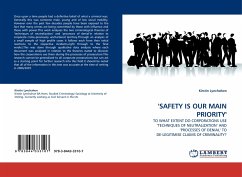Once upon a time people had a definitive belief of what a criminal was. Generally this was someone male, young and of low social mobility. However over the past few decades people have been exposed to the fact that many crimes are being committed by those with influence and those with power.This work analyses the two criminological theories of techniques of neutralization' and processes of denial'in relation to corporate crime-previously unchartered territory.Through an analysis of a small sample of high profile cases it follows each from their initial reactions to the respective incidents,right through to the final verdict.This was done through qualitative data analysis where each document was analysed in relation to the theories stated to discover how the corporations use them during the processes of prosecution.This research cannot be generalised to all corporate prosecutions but can act as a starting point for further research into this field.It should be noted that all of the information in this text was accurate at the time of writing in 2006/2007.








